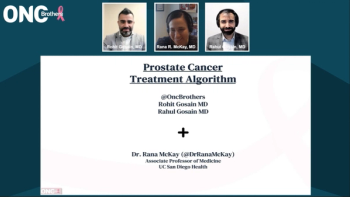
Focusing on patient-centered care, Rana R. McKay, MD, and the Oncology Brothers discuss the role of PSA and PSMA PET scans in guiding treatment for patients with prostate cancer.

Your AI-Trained Oncology Knowledge Connection!


Focusing on patient-centered care, Rana R. McKay, MD, and the Oncology Brothers discuss the role of PSA and PSMA PET scans in guiding treatment for patients with prostate cancer.

Medical oncologists provide clinical insights on treatment paradigms for patients with castration-resistant prostate cancer, highlighting how next-generation sequencing informs treatment decisions.

The Oncology Brothers and Rana R. McKay, MD, have a comprehensive discussion on the treatment of patients with castration-sensitive prostate cancer.

Rana R. McKay, MD, joins Rohit Gosain, MD, and Rahul Gosain, MD, to discuss the treatment algorithm for patients with localized prostate cancer.

Rana R. McKay, MD discusses presentations of interest that were presented at the 2023 Kidney Cancer Research Summit, including a discussion on how PET imaging may identify which patients with renal cell carcinoma may respond to immunotherapy.

A better understanding of tumor biology may be necessary for identifying novel non-immunotherapy–based therapeutic strategies for patients with renal cell carcinoma, according to Rana R. McKay, MD.

Probiotics and other agents targeting fatty acid oxidation are also under evaluation as treatment options for patients with renal cell carcinoma, according to Rana R. McKay, MD.

Other angiogenic agents are also under investigation in renal cell carcinoma, according to Rana McKay, MD, who indicates it will be interesting to see how they compare with belzutifan.
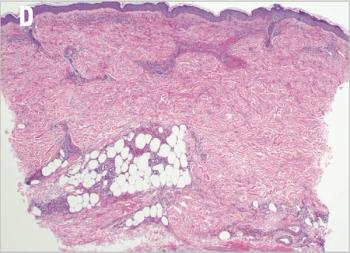
In this installment of Clinical Quandaries, Justine Panian, BS, and colleagues present a case of a 60-year-old Mexican woman with fevers, abdominal pain, and hypertension.

Brian Rini, MD, summarizes the thoughts of his colleagues on the use of lenvatinib plus pembrolizumab to treat advanced renal cell carcinoma.

A panel of oncologists look at what’s in the pipeline for advanced renal cell carcinoma, including trials and treatment options.
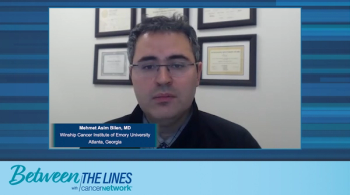
Two kidney cancer experts explore the current unmet needs for patients with advanced renal cell carcinoma.
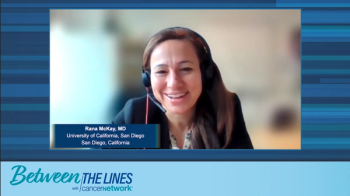
A look at the current unmet needs in front-line renal cell carcinoma treatment.

Oncologists review quality of life data for patients with renal cell carcinoma receiving lenvatinib plus pembrolizumab combination treatments.
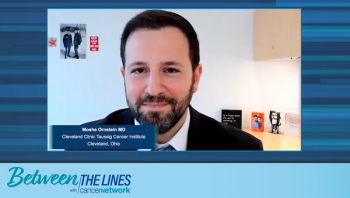
Kidney cancer experts explain how they dose lenvatinib in advanced renal cell carcinoma treatment to mitigate toxicities.

An explanation of dosing strategies when treating patients with renal cell carcinoma in the first-line with lenvatinib.

Experts discuss the safety of treating renal cell carcinoma with lenvatinib within different patient risk populations.

Possible comorbidities and other risk factors in advanced renal cell carcinoma that would affect potential treatment regimens.

A look at the factors considered in choosing an appropriate combination treatment for advanced renal cell carcinoma.

Drs Rana McKay and Tom Powles debate the merits of different first-line combination treatment regimens for renal cell carcinoma.

Experts discuss how data from the CLEAR trial affects the management of advanced renal cell carcinoma in their clinical practices.

Rana McKay, MD, and Tom Powles, MBBS, MRCP, MD, highlight key data from the CLEAR trial and offer their overall opinions on the combination of lenvatinib plus pembrolizumab for the treatment of renal cell carcinoma [RCC].

Oncologists give their initial impressions about the results of a clinical trial studying doublet combination therapies for advanced renal cell carcinoma.

Robert J. Motzer, MD, presents data examined in the article, “Lenvatinib Plus Pembrolizumab or Everolimus for Advanced Renal Cell Carcinoma.”

Rana R. McKay, MD, reflects on a proposal from her colleagues regarding a new model for guiding the treatment of prostate cancer that focuses on a “transitional” disease state.
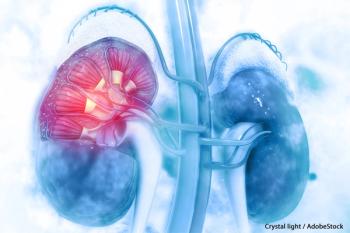
The expert from the University of California San Diego discusses the importance of the findings presented at the 2020 ASCO Virtual Scientific Program

Recent progress in our understanding of the pathogenesis of advanced prostate cancer has heralded a new era in treatment. Numerous agents now populate the treatment landscape, and an impressive number of novel agents are in development. However, many questions remain unanswered, paving the path for discovery in the future.
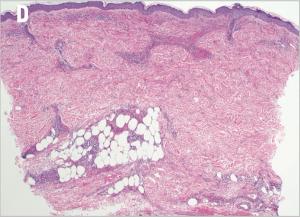
Published: May 11th 2022 | Updated:

Published: March 25th 2022 | Updated:

Published: December 19th 2012 | Updated:

Published: June 2nd 2020 | Updated: